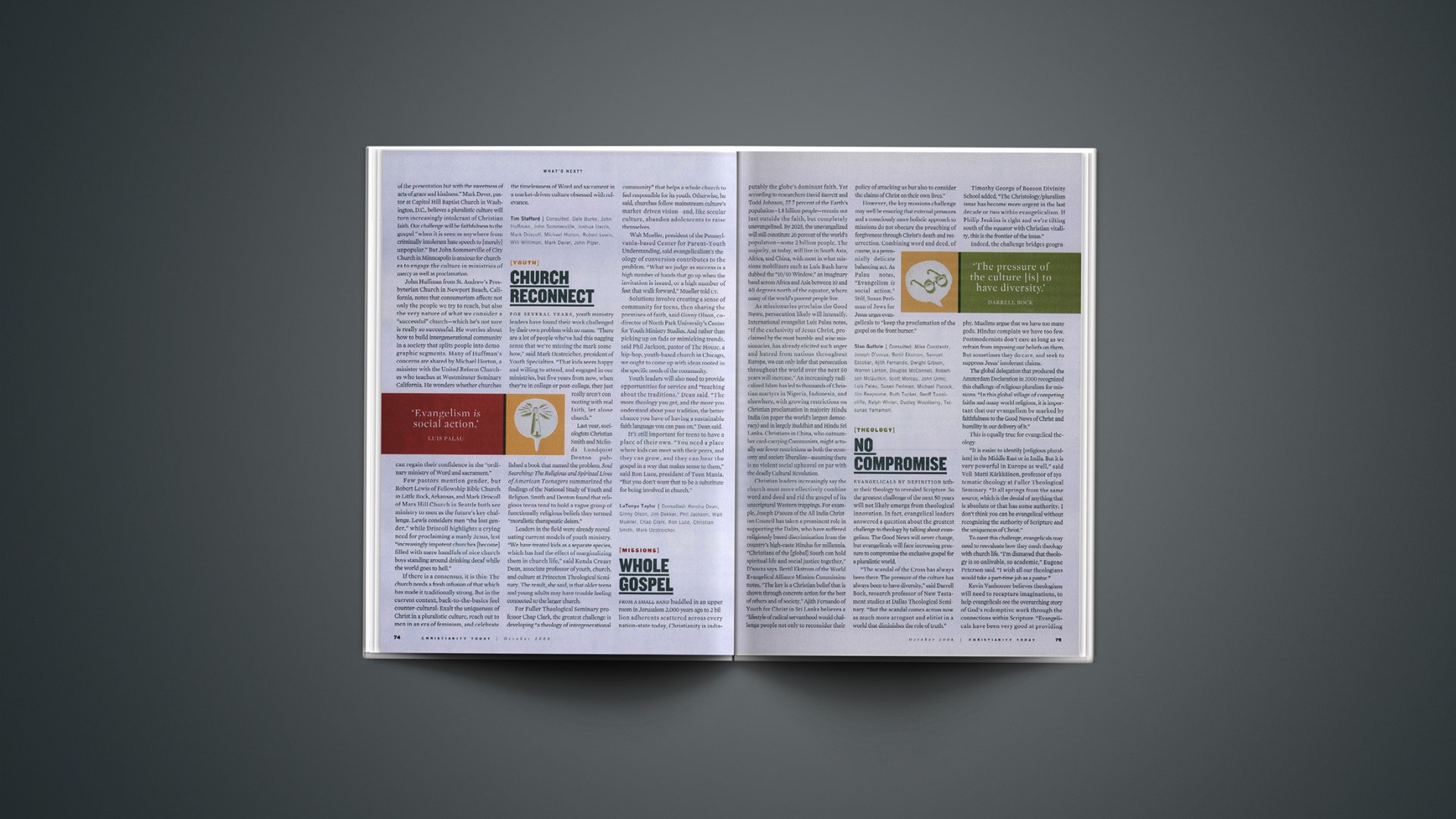We’re asked 114 leaders from 11 ministry spheres about evangelical priorities for the next 50 years. Here’s what they said about missions.
From a small band huddled in an upper room in Jerusalem 2,000 years ago to 2 billion adherents scattered across every nation-state today, Christianity is indisputably the globe’s dominant faith. Yet according to researchers David Barrett and Todd Johnson, 27.7 percent of the Earth’s population—1.8 billion people—remain not just outside the faith, but completely unevangelized. By 2025, the unevangelized will still constitute 26 percent of the world’s population—some 2 billion people. The majority, as today, will live in South Asia, Africa, and China, with most in what missions mobilizers such as Luis Bush have dubbed the “10/40 Window,” an imaginary band across Africa and Asia between 10 and 40 degrees north of the equator, where many of the world’s poorest people live.
As missionaries proclaim the Good News, persecution likely will intensify. International evangelist Luis Palau notes, “If the exclusivity of Jesus Christ, proclaimed by the most humble and wise missionaries, has already elicited such anger and hatred from nations throughout Europe, we can only infer that persecution throughout the world over the next 50 years will increase.” An increasingly radicalized Islam has led to thousands of Christian martyrs in Nigeria, Indonesia, and elsewhere, with growing restrictions on Christian proclamation in majority Hindu India (on paper the world’s largest democracy) and in largely Buddhist and Hindu Sri Lanka. Christians in China, who outnumber card-carrying Communists, might actually see fewer restrictions as both the economy and society liberalize—assuming there is no violent social upheaval on par with the deadly Cultural Revolution.
Christian leaders increasingly say the church must more effectively combine word and deed and rid the gospel of its unscriptural Western trappings. For example, Joseph D’souza of the All India Christian Council has taken a prominent role in supporting the Dalits, who have suffered religiously based discrimination from the country’s high-caste Hindus for millennia. “Christians of the [global] South can hold spiritual life and social justice together,” D’souza says. Bertil Ekstrom of the World Evangelical Alliance Mission Commission notes, “The key is a Christian belief that is shown through concrete action for the best of others and of society.” Ajith Fernando of Youth for Christ in Sri Lanka believes a “lifestyle of radical servanthood would challenge people not only to reconsider their policy of attacking us but also to consider the claims of Christ on their own lives.”
However, the key missions challenge may well be ensuring that external pressures and a consciously more holistic approach to missions do not obscure the preaching of forgiveness through Christ’s death and resurrection. Combining word and deed, of course, is a perennially delicate balancing act. As Palau notes, “Evangelism is social action.” Still, Susan Perlman of Jews for Jesus urges evangelicals to “keep the proclamation of the gospel on the front burner.”
Stan Guthrie | Consulted: Mike Constantz, Joseph D’souza, Bertil Ekstrom, Samuel Escobar, Ajith Fernando, Dwight Gibson, Warren Larson, Douglas McConnell, Robertson McQuilkin, Scott Moreau, John Orme, Luis Palau, Susan Perlman, Michael Pocock, Jim Reapsome, Ruth Tucker, Geoff Tunnicliffe, Ralph Winter, Dudley Woodberry, Tetsunao Yamamori.
Copyright © 2006 Christianity Today. Click for reprint information.
Related Elsewhere:
More Christianity Today coverage of missions and ministry is available in our full coverage area.
In the next two weeks, we’ll be looking at what evangelical leaders think are the priorities for the next 50 years in 11 categories: local church, youth, politics, publishing/broadcasting, theology, culture, evangelism, higher education, international justice and relief and development.
Christianity Today‘s other articles on its 50th anniversary include:
Where We Are and How We Got Here | 50 years ago, evangelicals were a sideshow of American culture. Since then, it’s been a long, strange trip. Here’s a look at the influences that shaped the movement. By Mark A. Noll (Sept. 29, 2006)
Sidebar: ‘Truth from the Evangelical Viewpoint’ | What Christianity Today meant to the movement 50 years ago. (Sept. 29, 2006)










